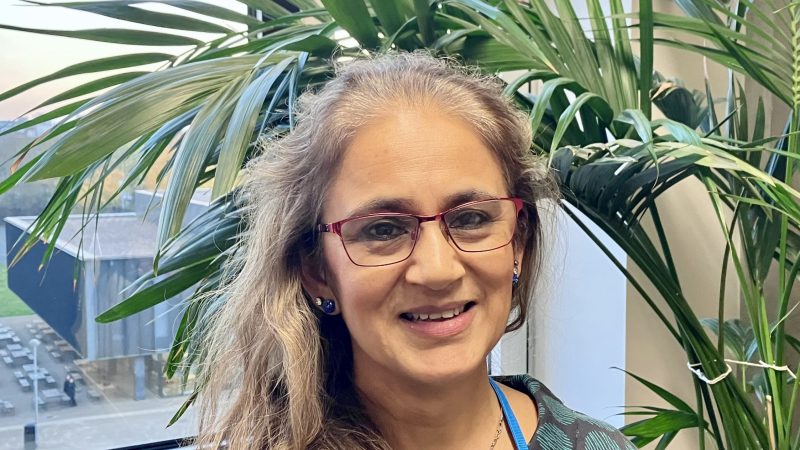Dipti Gandhi was doing a clinical pharmacist’s work in a doctor’s surgery long before they became common in general practice teams.
In fact, Dipti has been working in that role at the Brigstock and South Norwood Medical Partnership in Thornton Heath, where she is also a managing partner, for around 20 years now.
Almost two decades ago, people visiting the practice got a bit confused about her trailblazing role.
She explained: “We started off and it was a case of what are you doing there? You must work at the chemist. That’s how they used to think of it.
“But we’ve developed and had that relationship. They know that we’re there with the doctors and we’ve got access to the doctors if we need it. They’ve actually got a lot of benefit from what we offer.”
There are now over 1,000 full-time equivalent clinical pharmacists working across the country through the NHS England Clinical Pharmacists in General Practice Programme since it started in 2015.
Clinical pharmacists, who are highly qualified experts in medicines, work as part of the general practice team to improve value and outcomes from medicines and consult with and treat patients directly.
This includes providing extra help to manage long-term conditions and advice for those on multiple medicines and better access to health checks. The role is key to improving the quality of care and ensuring patient safety.
Having clinical pharmacists in GP practices also means that GPs can focus on, for example, diagnosing and treating patients with more complex conditions, which helps to manage patient demand.
Dipti recalls: “So when I first started it was working alongside general practice teams, understanding how general practice works and it was about supporting the Implementation of national strategies and local strategies that made a difference to people.
“Pharmacists fit in around medicines and optimisation of medicines, ensuring that people are using them properly and getting the benefits that they should. So, it started out like that and soon you began to learn how people grew with their patients.
“And that is really something that appealed to me because those relationships that you develop across time have really made a difference in our ability to make changes and support people.
“So, come what may, the relationships that you build with the patients that you have on your list are something that’s priceless.”
To illustrate the point, Dipti points to a patient with mental health issues and long-term conditions.
“He will only see me. And that’s been the case for the last seven years,” she said. “It’s ‘I want to see Mrs Gandhi. I don’t want to see anybody else’. So, he waits until he can see me – unless, of course, he’s really unwell. And I know when I speak to him if he’s not right and I can then get support from my senior GP.”
For Dipti, whose specialism is dealing with hypertension, or high blood pressure, and who is also the NHS South West London diabetes lead, “no day is typical” and “you don’t know who’s going to call and what they’re going call for”.
However, she said: “There is some constancy because I know that for example on a Wednesday I run a group consultation. My day is Wednesday and my colleague’s day is Friday. So, we do two group consultations a week and we see people with diabetes in them.
“I’ve got to prepare for that and get my head round who’s coming and what they need help and support with. We’ve been doing it for about four years now. There’s a group facilitator who supports the group dynamic and gets people talking to each other.
“And then the patients have what’s called shared medical appointments – they will discuss their individual problems and the others will listen. It’s all confidential and we have all of that side of things covered, but it’s a really good forum for people to support each other.
“Very often people who come to the group want to ask questions but don’t always feel confident to ask. So, if somebody else does, they can listen to the answer and have learned from it. It’s really powerful’’.
“I really love doing it because we learn from each other. They share tips and often they’ll come up with things that actually they wouldn’t share with you in a one to one consultation. So it’s much more personalised in a way, even though it’s a group setting.”
Dipti also works with community groups to support people with diabetes.
She said: “We’ve been doing work with Croydon BME Forum and the Asian Resource Centre in the community – healthy eating expert patient programme, hypertension, case finding – for example, it’s more prevalent that people from BME communities have high blood pressure.
“We’ve been giving blood pressure monitors and reviewing to see if it’s raised or not and offering treatment if it is.
“We’ve been working with our local pharmacists, who refer people for blood pressure checks now and that’s been really helpful. So we’re working in a in a way that hopefully reduces the burden on doctors but also builds those links with other people in the community with other skills – a lot more closer liaison with physios, with dietitians and social prescribers.”
In those near two decades at Brigstock and South Norwood Medical Partnership Dipti has packed in a lot of care and support for people in Thornton Heath and her passion for her job as a clinical pharmacist and for “making a difference” remains undimmed.
She said: “You can actually have a case load as a pharmacist in general practice, have your own patients and support them from prevention all the way through to treatment and referral on to hospital if needed. I think that variety has really driven my passion for working in general practice.”
